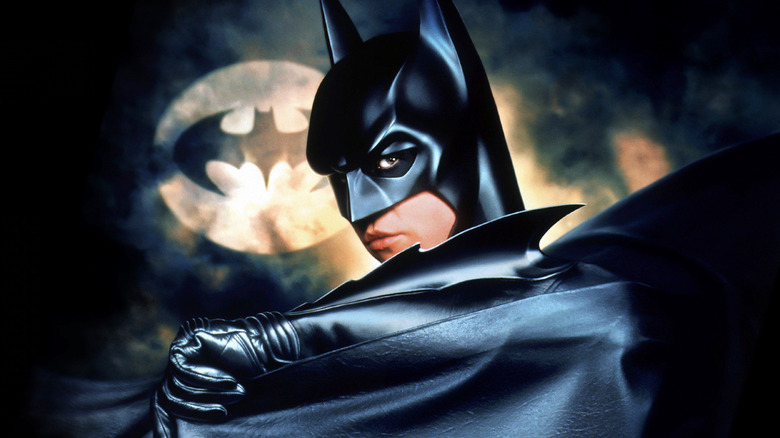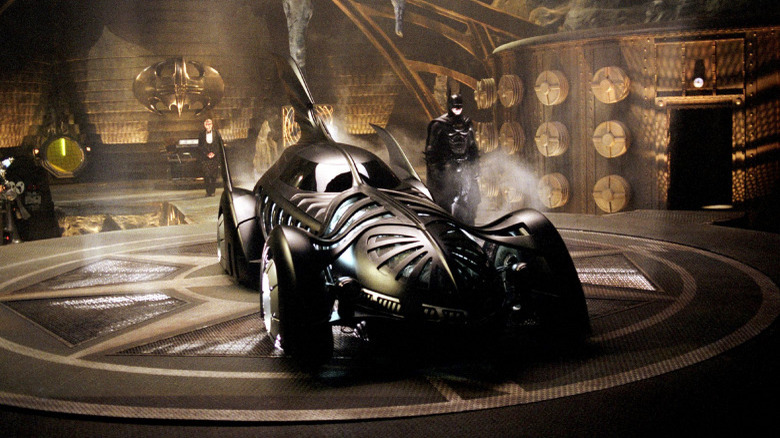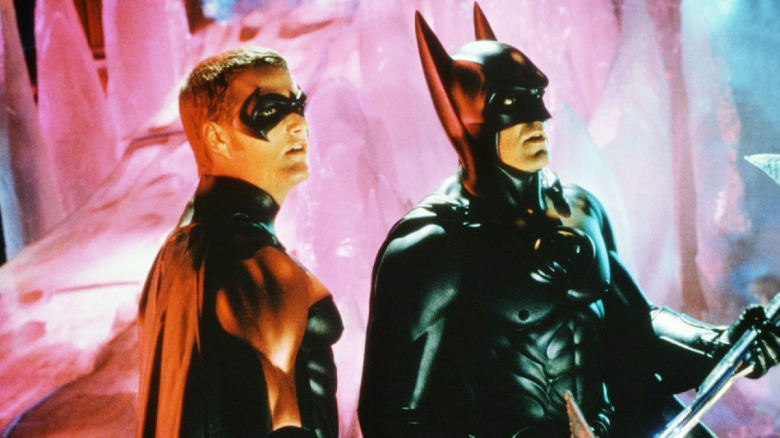Joel Schumacher Wanted To Make The Dark Knight Long Before Christopher Nolan
When Tim Burton agreed to direct the sequel to his 1989 smash-hit "Batman," it was under the condition that Warner Bros. would grant him greater creative control. The resulting film, 1992's "Batman Returns," was a no-holds-barred Burton affair, combining the filmmaker's affinity for the comically grotesque and horrifying with a Batman story where the villains are equal parts twisted and horny. Lest we forget, this is a movie where Danny DeVito as The Penguin nearly bites off a guy's nose, and then, 30 seconds later, lusts after a women with blood still dribbling from his mouth.
As is often the case in Hollywood, studio executives were okay with all this until the box office returns came in. Although it was well-received critically and more than tripled its $80 million budget, "Batman Returns" wound up grossing far less than its predecessor. It also committed the cardinal sin of upsetting Warner Bros.' marketing partner McDonald's, as Burton recounted to The Hollywood Reporter in 2017. Because of this, Warner Bros. declined to move forward with Burton's equally gothic vision for the next Batman movie and instead turned to Joel Schumacher (hot off directing the studio's legal thriller "The Client") to take the franchise in a more kid-friendly direction with what would become 1995's "Batman Forever."
Maybe Batman Is "Like Pi"
Unflattering reviews aside, "Batman Forever" was the brighter, sillier, and, most importantly to the studio, more lucrative Batman movie that Warner Bros. had wanted. So, after its success, the studio moved quickly to bring Schumacher back to direct its sequel: 1997's now-infamous "Batman & Robin." But before Schumacher served the world his banquet of ice puns and Bat-Credit Cards, he had his eye on making a Batman film that hewed closer to Christopher Nolan's crime thriller-style take on the property with 2008's "The Dark Knight."
As Schumacher recalled to THR in 2015:
"After 'Forever's success, I wanted to do 'The Dark Knight.' It was going to be very dark. I remember going to the set of 'Face/Off' and asking Nic Cage to play the Scarecrow. The studio, and I'm not sure the audience, was in a frame of mind to go too dark with Batman at that time. It's interesting how our culture has changed. How the socioeconomic, political culture makes it absolutely palatable to see Chris [Nolan]'s Batman — for instance, 'The Dark Knight Rises,' which is such a comment on exactly what's happening. You might be able to track that on all the movies. Maybe Batman is one of those things like pi. It's the center of the universe."
Schumacher could and absolutely did make engrossing thrillers as a director (see "Phone Booth"), and it certainly would've been interesting to see what he had in mind for a grimier, grislier spin on the Batman films. And yet, I can't help but be glad that he didn't go there. Maybe it's because we're coming off Zack Snyder's grimdark approach to the character in "Batman v Superman: Dawn of Justice" and "Justice League," but part of me is grateful we got to see the Caped Crusader's ridiculous side on the big screen for a few years.
Hear Me Out
As rough as Schumacher's run on the franchise was, he injected some welcome campiness back into the property with "Batman Forever." It's a far more colorful and cartoonish blockbuster than Burton's Batman movies, bathing Gotham City in neon lights while amping up the theatricality of its super-criminals. As /Film's Danielle Ryan has noted, the film was kept aground by its star, Val Kilmer, who brought just the right blend of broodiness, sexiness, and self-awareness to his dual roles as Bruce Wayne/Batman.
Compared to Schumacher's first outing with the Caped Crusader, "Batman & Robin" was even campier, more outlandishly colorful, and loaded with queer subtext. But his approach wasn't the reason the movie went off the rails. The real issue was that nobody who worked on "Batman & Robin" seemed to be on the same page. Warner Bros. wanted to turn the franchise into a glorified ad for kids toys, Schumacher tried to make a live-action cartoon by way of a gaudy Vegas show, and star George Clooney was too self-conscious to play the campiness with a straight face the way Adam West did as Batman in the 1960s.
Would Schumacher's "The Dark Knight" have been better than what we got? Sure, if Warner Bros. had given him real creative control, but that clearly wasn't going to happen. Instead, he made the glorious mess that is "Batman & Robin," which led to Nolan re-inventing the property in 2005 with "Batman Begins" and ushering in an era of director-led Batman movies that will continue with "The Batman" (which looks promising). So maybe it worked out for the best after all.


